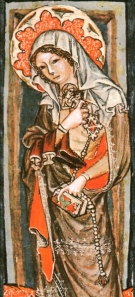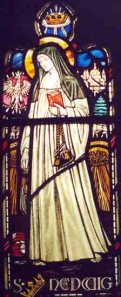St Hedwig’s Beads
I was intrigued by the graphic of St Hedwig from the Paternosters site (left) that shows St Hedwig with prayer beads so I decided to look around for more graphics of St Hedwig with beads. The only luck I have had so far is the modern stained glass window to the right. Unfortunately I now can’t find where this modern window comes from. Does it look to you like those are prayer beads in her hand? Its hard to tell if its prayer beads or a handle to a bag. As a modern window it could have also been inspired by the medieval graphic of her with beads.
So who is St Hedwig? She was a born in Bavarian, 1174, and married a Henry Duke of Silesia and later Duke of Greater Poland at age 12. One of her sisters married King Andrew of Hungrey and another sister became a Benedictine abbess of Lutzingen in Franconia in medieval Germany. Hedwig and Henry had seven children, including Henry the Pious, a duke of medieval Poland, who was killed in the battle of Legnica against the Mongols two years before Hedwig’s death. After the birth and subequent early death of their seventh child, Hedwig and Henry took public vows of chastity. Duke Henry went so far as become tonsured and took the lifestyle of a lay Cisterian brother. Hedwig was renoned for helping the poor and as a patroness of the church. Hedwig and her husband Henry founded and/or supported several monsateries for Augustinians, Dominicans, Francisicans, Cistercians and even Templars. In 1202 Henry founded a Cisterician convent at Trzebinca, the first religious foundation for women in Silesia, where he was buried in 1238 and she entered a convent upon his death. Their daughter Gertrude became the first abbess there. She was only there five years before her own death in 1243. Hedwig took the dress and lifestyle of a Cistercian sister but never took her formal vows so that she kept control of her revenue to direct it to the poor. Her pious reputation was such that she was considered a saint in her lifetime. Her daughter Abbess Gertrude was the only one of her seven children to survive her. Two of her grand-daughters by Henry the Pious did eventually become abbesses at St Clara of Trebinca. St Elizabeth of Thuringia and Mechtilde of Kitzingen were her nieces. She was canonized only 24 years after her death. St Hedwig’s Cathedral in Berlin was built by Frederick the Great in 1773 and is now the cathedral for the Archdiocese of Berlin.
References: St Hedwig, Wikipedi, and St Hedwig, New Advent website.
A the most complete image of the medieavel illustration I’ve found online but I haven’t been able to find any more specific information about its medieval source. If you know any more about St Hedwig’s beads, this illustration or the stained glass window above, please post a comment.
http://www.ibreviary.com/m/breviario.php
iBreviary
Wednesday, 16 October 2013
Wednesday of the Twenty-Eighth Week in Ordinary Time
For the Memorial of Saint Hedwig:SECOND READING
From the life of Saint Hedwig by a contemporary author
(Acta Sanctorum Octobria 8 [1853], 201-202a)
She Was Always Directed Towards God
Hedwig knew that those living stones that were to be placed in the building of the heavenly Jerusalem had to be smoother out by buffetings and pressures in this world, and that many tribulations would be needed before she could cross over into the glory of her heavenly homeland. And so she exposed herself completely to the waters of suffering and continually exhausted her body with rigorous chastisement. Because of such great daily fasts and abstinences she grew so thin that many wondered how such a feeble and delicate woman could endure these torments.
She afflicted herself with continual mortification of the flesh, but she did so with prudent discretion. The more attentively she kept watch, the more she grew in the strength of the spirit and in grace, and the more the fire of devotion and divine love blazed within her. She was often borne aloft with such ardent desire and impelled toward God that she would no longer be aware of the things that were around her.
Just as her devotion made her always seek after God, so her generous piety turned her toward her neighbor, and she bountifully bestowed alms on the needy. She gave aid to colleges and to religious persons dwelling within or outside monasteries, to widows and orphans, to the weak and the feeble, to leers and those bound in chains or imprisoned, to travelers and needy women nursing infants. She allowed no one who came to her for help to go away uncomforted.
And because this servant of God never neglected the practice of all good works, God also conferred on her such grace that when she lacked human means to do good, and her own powers failed, the divine power of the sufferings of Christ strengthened her to respond to the needs of her neighbors. And so through diving favor she had the power to relieve the bodily and spiritual troubles of all who sought her help.
RESPONSORY
See Proverbs 31:17-18
She set herself to work with courage;
she put forth all her strength;
– therefore her lamp will never go out.
She has discovered how good it is
to work for the God of wisdom.
– Therefore her lamp will never go out.


















.jpg)